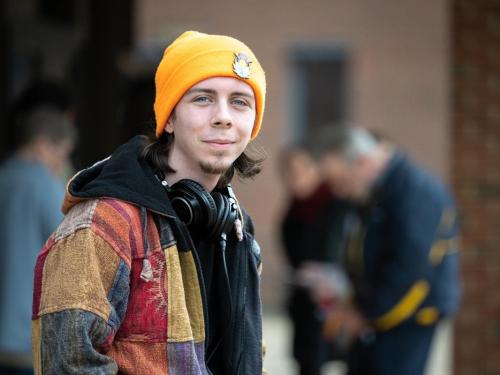
Penn State student Jonathan Massey will graduate in 2024 with a truly unique artistic experience for a math major. During the spring 2023 semester, he contributed voiceover work to a self-guided walking app created by theater artist Marike Splint and presented by the Center for the Performing Arts.
Splint, a University of California-Los Angeles theater instructor and creator, hired Massey to assist her team in producing her self-walk app 200 Acres, a site-specific, self-guided sound experience. The personal experience urges each user to think about “how we shape nature and how nature shapes us,” she said.
Massey said Penn State Pitch Exploration Lab Director Bryan Nichols shared an email chain from Splint in search of an assistant, which led to a voiceover and implementation role in the project. He called the process “a fortunate coincidence.”
“Very rarely does a college education become as personal as the opportunity I’ve had with 200 Acres. I’ve been taught various programs like Reaper, FMOD and Unity, and given insight into the app development process," Massey said. “But it has been more valuable to observe the creative process that the team has gone through to complete a project that they are proud to attach their name to.”
200 Acres, a reference to the acreage of land originally granted to Penn State, is sequel to Splint’s 400 Acres, a similar project highlighting a plot of green space in Los Angeles. The app’s self-guided, 1-mile tour leads the user on an introspective, walking and prompted experience along a route leaving from the patio at Eisenhower Auditorium and ending at The Arboretum at Penn State.
The app and an artist residency is part of the center’s Reflection Project and was funded by the Mellon Foundation. The residency brought Splint and a small group of assistants to visit Penn State in the fall of 2022 and again in March to take field recordings and conduct interviews with figures on campus.
200 Acres is scheduled to launch on Sunday, June 11. Visit the project's website for more information.
As the 200 Acres script guides the user, Splint’s voiceover provides commentary about buildings and land history — from rich histories of trees and personal reflections on family "togetherness" to the Penn State milking barns and mountainous views.
Massey said the app’s use of geolocation software drew him to the project, more specifically to “the possibilities of joining theater with game development to create artistic experiences that mimic the tried-and-true video game aspects that make playable stories compelling.”
“No amount of instruction on how to create art would give this kind of experience. I’ve felt confident in my own artistic ability, even though my major has little indication of creativity. It gives me pride that I’ve been able to accomplish this dream in some way," Massey said.
“His interest in music tech made him a natural fit to help us with the project,” Splint said of Massey’s contributions to the app.

Finding a creative outlet
“Those outside the field may see [math and music] as separate, but everyone within the discipline wishes they did more of either. I hear lots of math students looking for creative outlets, especially those that had an interest in music previously," Massey said. "Lots of music people are looking to study physics, computer science or data science. Data science shows up in the research that I conduct, group theory shows up in music theory, probability shows up in noise generating functions and music synthesis."
Interdisciplinary practices are something Massey aims to demonstrate in his work, he said.
“I’ve been repeatedly shown the value of letting otherwise separate fields ‘talk,’ by exchanging ideas and methods for the betterment of both disciplines. It has been my goal to do this with math and music, an area I feel I am academically strong in and an area where my passion lies,” Massey said.
Massey was drawn to Penn State in part because of the Pitch Exploration Lab, an interdisciplinary cognition lab. He was told about the lab during an open house, he said, which influenced his choices on where to go to college. The lab has been a part of his education throughout his time at the University, he said.
“I am currently working on a research project aiming to measure music’s effect on a listener in the context of eight-channel circular speaker arrays. The research uses tasks of auditory imagery, attentional flexibility, working memory and emotional valence. I’ve been reviewing music cognition literature to inform the process and hope to conduct the study in my senior year," Massey said.
Find the Center for the Performing Arts on Facebook, Twitter and Instagram.
